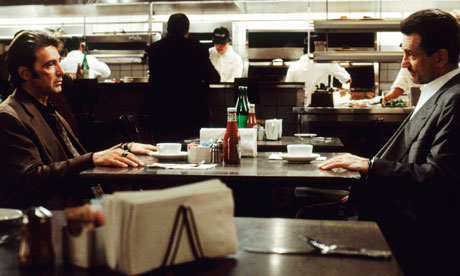Synopsis:
David Mann (Dennis Weaver), on his way to a business appointment, pulls out of his garage, leaves his city, and heads out onto the unfamiliar desert highways. As he slowly moves away from civilization, David Mann passes a slow moving oil tanker truck, and becomes its unwilling prey. The truck is relentless in its pursuit, and David must summon the courage and strength to escape alive while struggling to maintain a firm grasp on his psyche.
Review:
‘Duel’ is a simple story. A man encounters an unknown threat and must learn to defeat it. A simple story but yet it is a film that is so well paced and shot, that it creates an energy which carries the film to its satisfying conclusion.
Steven Spielberg was merely 25 when he made this film. Originally a television movie, it became such a spectacular ratings winner that it was released theatrically overseas with an additional 16 minutes of footage. This was the film, not ‘Jaws’ (1975), which helped to put Spielberg on the map in Hollywood.
This film grabs the viewer immediately from the opening segment through its use of a P.O.V. perspective. The first shot that the audience witnesses is from David Mann’s eyes as he exits from his garage. Immediately, the audience has identified with the person that will guide us on this journey.
In only a few moments, Spielberg provides a tremendous amount of information that will be crucial in understanding the character of David Mann. As the opening credits role, the viewer sees David Mann leaving the familiarity of his street, his downtown, and his city all within a few shots. One other important fact is conveyed as well. People slowly disappear. Where there were many in the city, there are less and less as David makes his way out of the confines of his familiar land and into the unknown desert landscape. The audience understands that David is now out of his element because he is unaware of his surroundings. Not one word is spoken by Mann, but yet the audience already knows a tremendous amount about him, which will be significant when he is tested later on in the film.
As was noted earlier, this is a film that involves a simple story. As David Mann proceeds on his journey farther into the desert, he encounters a big and slow moving oil tanker truck. The tanker is a disgusting monstrosity, and it is quite apparent that it has been involved in numerous battles, whether it be with the road or other drivers. The truck is shot in such a way as if to convey that this piece of machinery is a living entity. It is menacing, loud, and very overwhelming to Mann, considering Mann is driving a 1970 Plymouth family car. When the audience first encounters this truck, Spielberg voyeuristically surveys the entire body of the vehicle. As the camera pans from the back to the front of the behemoth truck, the audience is granted a glimpse at the beast that will be the cause of David Mann’s troubles from hereon out. As the camera reaches the front, the audience also views many license plates (perhaps souvenirs from his victims). However, the audience is not allowed to see the face of the driver. He is the unknown stalking the unknown in a foreign land.
In Hollywood films, the desert has always been labeled as a survival of the fittest type of environment. Thus, there is a strong presence of masculine ideals existent within the outback (as is the case in many Australian films). How ideal that there is to be a battle of supremacy between a willing combatant and a man in desperate need to display some sort of masculinity for the audience.
The unknown has always been feared. In typical horror films, sensing and understanding that there is an evil presence is always much more terrifying then actually witnessing what the threat is. Your imagination is allowed to take over and create many disturbing and frightening visuals as a result. One of Spielberg’s key themes throughout his films is of the ordinary coming under attack from the extraordinary (think ‘Jaws’, ‘Jurassic Park’ (1993)). David Mann is an ordinary (perhaps ‘nerdy’) man, conveyed through his look, his car, and even his name. As he ventures into foreign land, he comes into contact with an extraordinary being, which is symbolized by the menacing presence of the truck.
After the initial introductions, it is time for the game to begin; and what a game it is. For the next 80 or so minutes, the audience becomes an unwilling voyeur in a sadistic game perpetrated by this relentless and menacing foe. Nothing will be spoiled for those who have not seen it, but it is definitely a ride to be experienced. This is a film that resembles the emerging creativity that Spielberg would quickly come to grasp and use towards all of his future films.
However, this film would not have been as great as it is if it were not for the truly remarkable performance provided by Dennis Weaver. He is basically the only character on screen, and thus he becomes our guiding point. The viewer identifies with him and, as a result, truly begins to understand him as a character. Fear, relief, paranoia, jubilation, and so on are all convincingly conveyed by Weaver. This is not an easy character to portray, but yet Weaver excels in his ability to create a character determined to survive.
This film is so simple but yet so intriguing and suspenseful. There are not enough words to describe the excitement this film helps to create. Though it was made in 1971, this film still packs quite a wallop. It is definitely a classic in every sense of the word.



